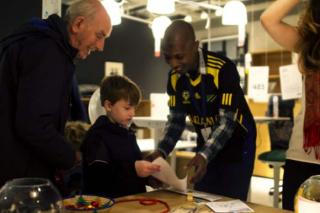In an article published on Thursday April 5, 2018 in The Scotsman newspaper, CR&DALL core member, Dr Mia Perry, calls for "decisive changes to the way we collaborate...substantial resources will continue to be spent at a rapid rate; but the trajectory of change and development in the world will remain consistent with that of the past 50 years".
The full article can be accessed at this link; the text of the article follows:
Source: The Scotsman, Thursday April 5, 2018
Mia Perry: Aid is all very well but fair exchange and self awareness may matter more
If you have £10 in your pocket and you want to do some good for the world, what is the best way to spend the money? Is it more helpful to donate to an international charity, or pay steep prices for local produce over cheaper, often more accessible products, that have been imported from Africa?
I ask myself this question frequently. My work takes me to places far removed from my home to ‘help,’ to ‘develop,’ to ‘solve problems.’ What makes me think that my good intentions, my money, my version of developed/sustainable/happy have any relevance to communities in Malawi or Uganda? How can I make choices at home that create positive impact?
In the name of “development” and “aid” billions of pounds have been spent from the Global North on challenges materialising in the Global South: from poverty to environmental protection, from gender equality to health. Countless academics, development workers, and administrators have focused innovation, intervention, programmes and practices on supporting development in the “developing world”.
The Sustainable Futures in Africa Network (www.sustainablefuturesinafrica.com), a consortium I lead, is a collective of researchers, educators, development workers, and communities that spans the UK (primarily the University of Glasgow) and countries across Africa (Malawi, Uganda, Botswana, and Nigeria in particular).
We work across diverse areas of expertise, sectors and geographies to address the social, cultural, and ecological aspects of sustainable development. Together, we focus on questions around how to rethink the development research status quo for more positive future outcomes.
The flow of aid money and resources, coupled with increasing global morality and mobility is broadening pipelines between the Global North and South, yet there is an unsettling current to development trends.
In reality, the Global North (albeit an ever-decreasing section of the Global North) becomes ever more powerful and prosperous, and more resilient to climate change; while the Global South addresses an ever-decreasing area of fertile land, a growing population of people living in poverty, and an increasing threat of food security. For all of our good intentions and promises of funding and expertise, global inequalities and development challenges persist – in many areas increase.
The Sustainable Futures in Africa Network has grown out of questioning this type of development and development-related research. We are convinced that there are fundamental oversights in the practices, processes and natures of collaborations.
Unless we make decisive changes to the ways we collaborate, across the vastly different settings of our homes, cultures and disciplines then substantial resources will continue to be spent at a rapid pace; but the trajectory of change and development in the world will remain consistent with that of the past 50 years. The north gets richer, the south gets poorer. Why would we expect anything different if we continue as normal?
Global challenges relating to poverty and environmental sustainability in the Global South require engagement with multiple disciplines, knowledges, and stakeholders.
The challenge goes beyond working across science, society and culture. It encompasses working across very different perspectives and lived experiences.
We cannot genuinely support positive change or sustainability without ways to communicate and collaborate across these differences. As we do so, we find that no one alone has the solution, no one knows ‘best,’ but together we discover directions and possibilities that make sense (and often surprise) all involved.
As I give, donate, or purchase to create positive change, I am making a difference to others and also to myself. I am accountable for the giving, but also for the impact of the giving. I am mindful of the consequences of my donation or contribution; conscious that I do not want to contribute to the same systems of global inequality that I am trying to alleviate.
So, I choose to spend my £10 in exchange for a product or cause that I am engaged with and understand. This might look like a fair-trade purchase from a market in my neighbourhood instead of a cheaper version at the large chain supermarket; or choosing to purchase a locally produced or second-hand shirt rather than the cheaper new one from a brand-name company who source labour and materials from resource- poor countries such as Bangladesh.
Positive influence in the world must be based on fair exchange and self-awareness, not simply good intention or aid.
Dr Mia Perry
https://www.sustainablefuturesinafrica.com
Read more at: https://www.scotsman.com/news/opinion/mia-perry-aid-is-all-very-well-but...
Nike air jordan Sneakers | Men’s shoesDiscussion topics:
- Log in to post comments














Latest Comments